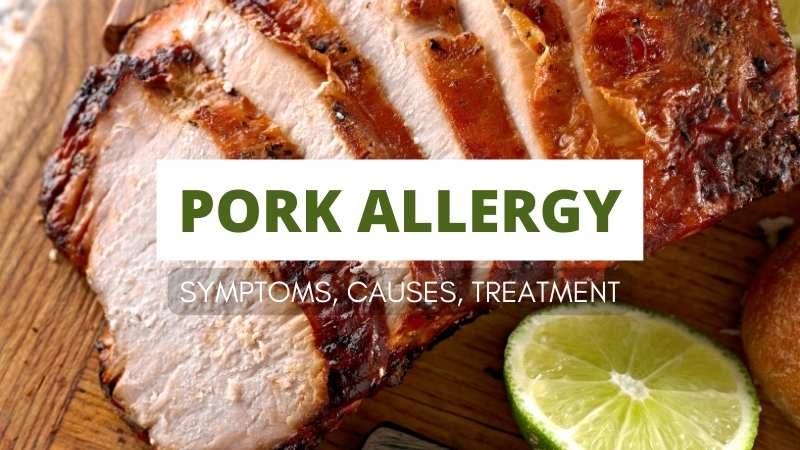Allergies are prevalent. Many people cannot take certain foods because they are allergic to them. Studies indicate that nearly 10% of the world population suffers from some kind of food allergy, impacting their daily lives and dietary choices. Common food allergies include those to nuts, dairy, and shellfish, with reactions ranging from mild to severe. Source.

Allergic reactions can be in the form of rash and bumps on the skin and cause much itching. One can get rid of the allergic by avoiding the substance causing the inflammation.
Pork Allergies: Science Behind the Reaction
Pork allergy is a genuine concern for individuals suffering from it, though it is rare. The allergic reaction to pork is primarily due to a specific protein called “alpha-gal.” This protein is found in the meat of mammals, including pork. It is also found in beef, rabbit, lamb, and venison. The immune system of the person allergic to alpha-gal thinks it is a threat and releases immunoglobulin E (IgE) antibodies. They release histamines, hence the allergic symptoms.
The alpha-gal can is also linked to bites from certain ticks, like the Lone Star tick. Studies show that tick bites can trigger sensitivity to alpha-gal, leading to a delayed allergic response to red meats. This unique reaction highlights how environmental factors influence food allergies. Source.
Symptoms of Pork Allergy
Below are some of the primary pork allergy symptoms:
- Skin reactions: You might notice hives, itching, or even eczema after eating pork.
- Stomach problems: For some, it’s nausea, vomiting, diarrhea, or stomach cramps, making pork feel like a meal gone wrong.
- Breathing issues: Symptoms like sneezing, coughing, nasal congestion, wheezing, or shortness of breath can show up, sometimes right after eating.
- Swelling: This can affect the lips, tongue, throat, or face and may feel intense, especially around the mouth.
- Anaphylaxis: In rare cases, the body goes into overdrive, causing dangerous symptoms like trouble breathing, a sudden drop in blood pressure, dizziness, or fainting. This can be life-threatening and requires immediate attention.
One unique aspect of pork allergy is alpha-gal syndrome. This type is caused by a tick bite (from the Lone Star tick) and can create delayed reactions to red meats, including pork.
It’s worth noting that different methods of meat processing may affect the likelihood of an allergic reaction. For example, smoking or curing meat can introduce new compounds that sometimes trigger immune responses. People with food sensitivities are often encouraged to consume fresh, minimally processed foods. Source.
Treatment for Pork Allergy
- One must not have any contact with the allergen.
- One can make use of antihistamine to maintain a check on the secreted histamine.
- It is good to take an adrenalin injection in case an anaphylaxis reaction tends to occur.
- Make use of bronchodilators for checking the asthmatic symptoms.
Other forms of treatment for pork allergy
- Bromelain.
- Quercitin.
- Vitamin A.
- Euclayptus.
- L-Carnitine.
- Iron.
Bromelain and quercetin, often derived from natural sources, are known for their anti-inflammatory effects and are widely used for managing mild allergy symptoms. Consulting with a healthcare professional can help ensure safe use of these supplements alongside other treatments. Source.
One must consult one’s physician in case he decides upon a course of treatment or changes from one therapy to another.
Here are some more choices of treatment for pork allergy
- Eye-drops for allergic conjunctivitis.
- One can make use of nasal sprays.
- Inhale beta agonists .as well as corticosteroids.
- One can have oral steroids for allergic reaction, which happens to be moderate.
- One can go in for desensitization to get used to the allergen.
- In case of anaphylactic, then one may have to go in for hospitalization.
Immunotherapy, also known as desensitization, is sometimes recommended for severe cases. It involves gradually introducing small amounts of the allergen to build tolerance over time. This approach can be helpful for those with persistent allergies and is under ongoing research. Source.
One can overcome an allergy to pork by taking the required medical help available in various treatment forms.

1 Comment
Hi, I get very severe stomach pains and cramps after I eat pork meat.
I have tried everything to soothe it, nothing works.
I can’t eat or drink anything because it gets worse.
I can’t sleep, because the cramps keep me awake.
I don’t know what to do anymore. The doctors’ medicine doesn’t even work.
So I don’t know.
Please help.
I try my best to prevent eating pork and I haven’t eaten pork in a very long time, but Monday the cramps started again. I don’t know why, but it’s really bad everytime.
Thank you.